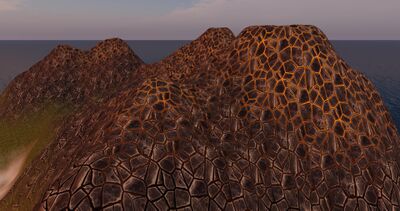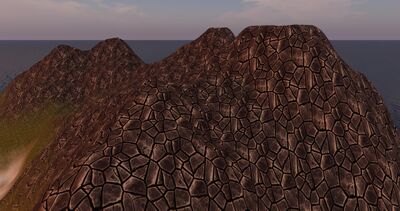Difference between revisions of "PBR Terrain"
m (Clarification on number of transforms) |
(PBR terrain core feature is no longer in beta) |
||
| (One intermediate revision by the same user not shown) | |||
| Line 1: | Line 1: | ||
[[Category:glTF]] | [[Category:glTF]] | ||
| Line 10: | Line 4: | ||
The PBR Terrain project brings [[PBR_Materials|PBR materials]] to the [[Terrain]] in Second Life. | The PBR Terrain project brings [[PBR_Materials|PBR materials]] to the [[Terrain]] in Second Life. | ||
== How to apply PBR Terrain == | == How to apply PBR Terrain == | ||
| Line 22: | Line 14: | ||
# Click World > Region/Estate > Terrain | # Click World > Region/Estate > Terrain | ||
# Click on Terrain Textures and | # Click on Terrain Textures and ensure "PBR Metallic Roughness" is checked | ||
# Set PBR materials for all four material swatches | # Set PBR materials for all four material swatches | ||
# Click Apply | # Click Apply | ||
| Line 48: | Line 40: | ||
Method 1: Use the Region/Estate tool (requires region terrain edit permission) | Method 1: Use the Region/Estate tool (requires region terrain edit permission) | ||
# | # Click World > Region/Estate > Terrain | ||
# Click on Terrain Textures and ensure "PBR Metallic Roughness" is checked | |||
# Set PBR materials for all four material swatches as desired | |||
# Go to the "Transforms" sub-tab, and set texture transform parameters for each material as desired | |||
# To go back to using the respective default texture transforms, set the respective settings to their defaults | |||
Method 2: Use the debug settings (not persistent, visible only to you, debug settings subject to removal) | Method 2: Use the debug settings (not persistent, visible only to you, debug settings subject to removal) | ||
Revision as of 10:56, 27 June 2024
What is it?
The PBR Terrain project brings PBR materials to the Terrain in Second Life.
How to apply PBR Terrain
Before you can apply PBR terrain, you will need to acquire some PBR material items.
A PBR region is not required, but PBR terrain will only be visible to other users who also are using the PBR terrain viewer.
Method 1: Use the Region/Estate tool (requires region terrain edit permission)
- Click World > Region/Estate > Terrain
- Click on Terrain Textures and ensure "PBR Metallic Roughness" is checked
- Set PBR materials for all four material swatches
- Click Apply
- To go back to using terrain textures, remove all PBR materials, set the drop-down to Terrain Textures, and apply the desired textures
Method 2: Use the debug settings (not persistent, visible only to you, debug settings subject to removal)
- Click Advanced > Show Debug Settings
- Copy the material UUID you want from your inventory to your clipboard
- Set LocalTerrainAsset1, LocalTerrainAsset2, etc to the material UUIDs you want to use
- To go back to using the real terrain textures/materials, set LocalTerrainAsset1, LocalTerrainAsset2, etc all back to their defaults, or restart your viewer
Texture Transforms
| Warning! Future feature | |
|
This function will be supported in the upcoming GLTF Development Project. |
Custom texture transforms can be applied to PBR terrain, allowing for custom scale, rotation, or offset. There is one texture transform per material swatch (4 total). Applying a texture transform to each individual texture info is not supported.
The transforms are thus compliant with a subset of the KHR_texture_transform specification. The UV origin is defined as the Southwest corner of the region, with positive U facing East and positive V facing South.
Method 1: Use the Region/Estate tool (requires region terrain edit permission)
- Click World > Region/Estate > Terrain
- Click on Terrain Textures and ensure "PBR Metallic Roughness" is checked
- Set PBR materials for all four material swatches as desired
- Go to the "Transforms" sub-tab, and set texture transform parameters for each material as desired
- To go back to using the respective default texture transforms, set the respective settings to their defaults
Method 2: Use the debug settings (not persistent, visible only to you, debug settings subject to removal)
- Click Advanced > Show Debug Settings
- Important: Ensure LocalTerrainAsset1, LocalTerrainAsset2, etc are set to valid materials (Local terrain texture transforms will not affect the persistent region terrain, even if the region terrain uses PBR)
- Look for debug settings prefixed with, "LocalTerrainTransform", and set their values as desired. For example, LocalTerrainTransform1Rotation sets the rotation for material 1.
- To go back to using the respective default texture transforms, set the respective settings to their defaults
Graphics support
Emissive texture
When possible, PBR terrain respects all parameters of version 1.1 of the SL Material asset, with the exception of double-sided.
On graphics drivers that do not support binding more than 16 textures, the emissive textures will be dropped, in accordance with the GLTF specification.
Other textures
Further terrain textures may be dropped at low graphics settings to maintain performance.
Triplanar mapping
Triplanar mapping is enabled by default on PBR terrain when the graphics quality setting is set to "High" or higher.

